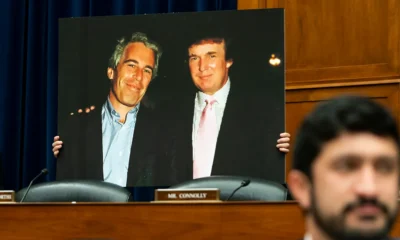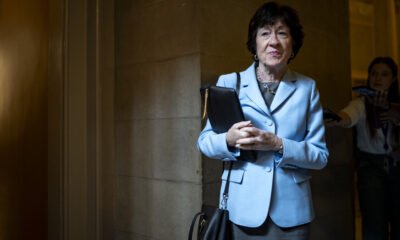Politics
Trump Scores Temporary Win as Court Pauses Ruling Against Tariffs Amid Legal Chaos
Federal appeals court halts decisions blocking Trump’s tariffs, keeping them active while the legal battle over presidential trade powers escalates.
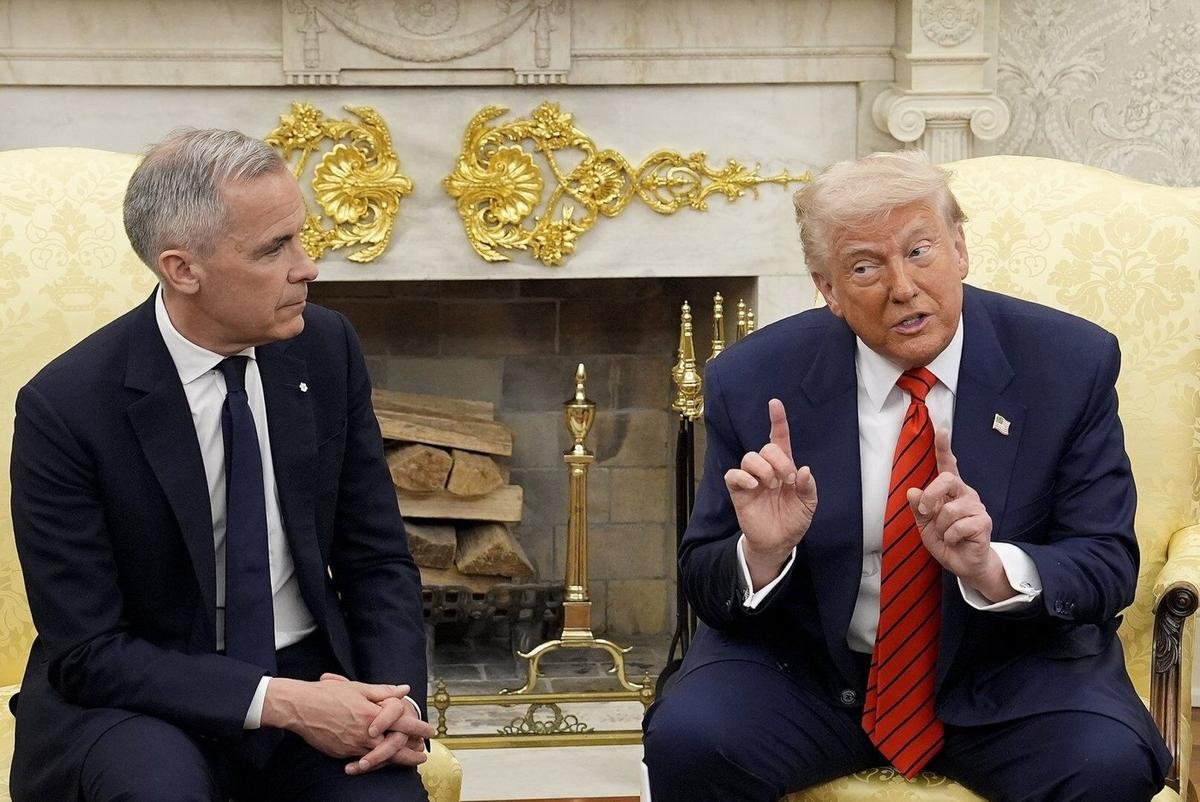
In a dramatic legal twist, former U.S. President Donald Trump secured a temporary reprieve on his controversial tariff policies, as a federal appeals court paused lower court rulings that had deemed them unlawful. The U.S. Court of Appeals for the Federal Circuit issued an administrative stay on Thursday, allowing Trump’s sweeping tariffs to remain in place — at least for now — while a broader appeal is reviewed.
This development follows a recent ruling from the U.S. Court of International Trade, where a three-judge panel — appointed by Presidents Reagan, Obama, and Trump — unanimously found that Trump overstepped his authority under the decades-old International Emergency Economic Powers Act (IEEPA). The panel concluded that the act did not grant the president “unbounded tariff authority.”
Trump, never one to hold back, took to Truth Social to blast the lower court’s decision, questioning whether personal bias played a role. “Where do these initial three Judges come from? How is it possible for them to have potentially done such damage to the United States of America? Is it purely a hatred of ‘TRUMP?’” he wrote, despite the fact that one of the judges involved was his own appointee, Judge Timothy Reif.
Trump’s trade policy, which frequently deployed tariffs as leverage in negotiations with China, the EU, and other major economies, has long been a lightning rod for legal and political scrutiny. His administration used IEEPA to justify tariffs, arguing it was a national security matter — a claim many legal experts and judges have disputed.
While Thursday’s stay is procedural, it reflects the high stakes involved. The next critical date is June 9, when both parties will submit arguments to determine whether the stay should continue throughout the appeal process. Jeffrey Schwab, an attorney for the plaintiffs at the Liberty Justice Center, noted, “We are confident the Federal Circuit will ultimately deny the government’s motion.”
Still, Trump loyalists were quick to hail the court’s temporary pause as a win. Kevin Hassett, former Director of the National Economic Council, described it as a “big victory” on Fox News. Meanwhile, former White House trade advisor Peter Navarro, known for his aggressive stance on tariffs, claimed the administration would “find another way” to impose trade barriers, even if they ultimately lose this case.
Adding fuel to the fire, a separate federal court ruling on Thursday further complicated the landscape. U.S. District Judge Rudolph Contreras ruled that Trump lacked the authority to impose certain tariffs under the same emergency powers law, particularly in a case involving small educational toy makers. The judge warned that granting such sweeping powers to the president would undermine the constitutional balance and eliminate congressional oversight on economic decisions.
“The president cannot act unlawfully and then use the effects of having that action declared unlawful as a putative shield from judicial review,” Judge Contreras wrote in a sharp rebuke of executive overreach.
Despite this, Secretary of State Marco Rubio defended the administration’s tactics, stating that halting the tariffs would “cause significant and irreparable harm to U.S. foreign policy and national security.” He pointed to ongoing sensitive negotiations and potential manufacturing setbacks that could weaken the country’s defense posture.
This legal saga comes amid broader political maneuvering. The White House is pressing forward with its “One Big Beautiful Bill,” a legislative package that includes tax cuts and expanded immigration enforcement — an agenda closely aligned with Trump’s vision. However, critics like Senate Democratic leader Chuck Schumer warn it could gut vital social programs.
Meanwhile, Trump continues to pressure the Federal Reserve to lower interest rates, despite Chairman Jerome Powell reaffirming the bank’s independence in a meeting with the former president.
As these legal and political battles unfold, the stakes are monumental — not just for Trump’s legacy but for the limits of presidential power in economic policymaking. The courts have yet to deliver a final verdict, but one thing is clear: the fight over Trump’s tariffs is far from over.
Politics
Trump and Kennedy Spark Outrage After Linking Tylenol and Circumcision to Autism: “You Have to Tough It Out”
Health Secretary Robert F. Kennedy Jr. and former President Donald Trump have reignited controversy after warning against Tylenol use during pregnancy and infancy — despite medical experts calling their claims unproven.
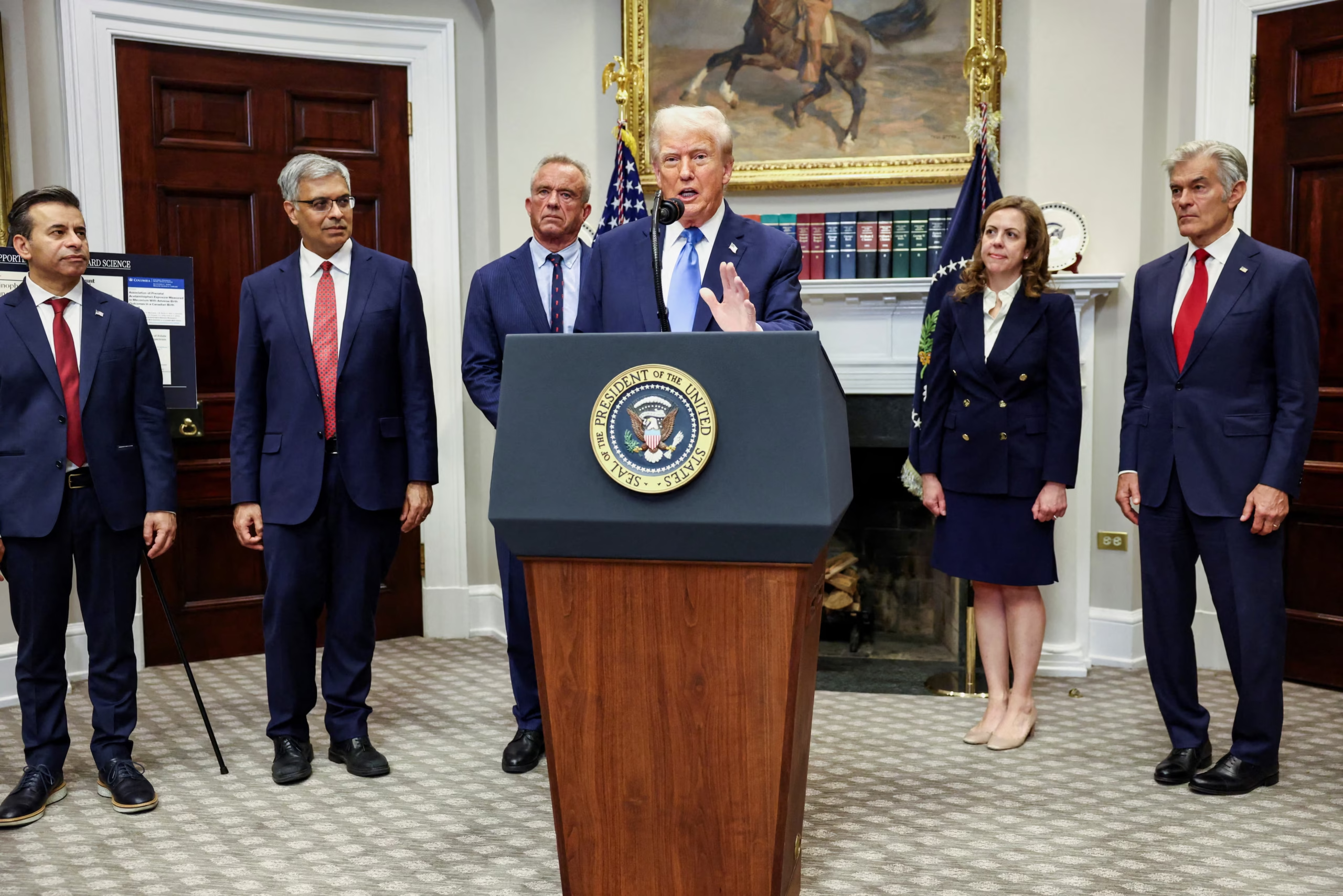
WASHINGTON, D.C. — A new political storm is brewing in Washington after Health Secretary Robert F. Kennedy Jr. (Wikipedia) claimed that circumcised boys are twice as likely to be diagnosed with autism, linking the condition to the use of Tylenol (acetaminophen) — an assertion widely dismissed by health experts as scientifically unsubstantiated.
Kennedy made the comments during an October 9 Cabinet meeting led by former President Donald Trump (Wikipedia), further escalating their joint campaign warning pregnant women and new mothers against using Tylenol.
“There are two studies that show children who are circumcised early have double the rate of autism,” Kennedy said during the meeting. “It’s highly likely because they’re given Tylenol.”
Trump and Kennedy’s Unproven Health Crusade
The controversy began on September 22, when both Trump and Kennedy publicly urged pregnant women not to take Tylenol, citing what they called “alarming data” about the drug’s possible link to autism.
Trump doubled down on that message during the recent Cabinet meeting, stating bluntly:
“I would say don’t take Tylenol if you’re pregnant. And when the baby is born, don’t give it Tylenol.”
Kennedy followed up by claiming that while causation hasn’t been definitively proven, “the correlation is so strong that it would be irresponsible to ignore it.”
“It’s not dispositive that it causes autism,” Kennedy added, “but it’s so suggestive that anybody who takes the stuff during pregnancy is irresponsible.”
Their statements immediately drew sharp criticism from medical organizations, including the American College of Obstetricians and Gynecologists (ACOG) and the Society for Maternal-Fetal Medicine, both of which reaffirmed that acetaminophen remains the safest pain relief option for pregnant women when used appropriately.
Medical Experts Push Back
The pharmaceutical company Kenvue (LinkedIn), which manufactures Tylenol, swiftly issued a statement emphasizing that extensive research has found no causal link between acetaminophen use and autism.
“Studies to date show no evidence that acetaminophen use during pregnancy causes fetal developmental issues,” Kenvue said.
The U.S. Food and Drug Administration (FDA) has similarly not issued any guidance against Tylenol for pregnant women, instead advising them to avoid ibuprofen after 20 weeks of pregnancy due to risks of fetal kidney damage.
Dr. Lisa Masterson, a California-based obstetrician and former co-host of The Doctors, told Daily Global Diary that Kennedy’s remarks are “reckless and deeply misleading.”
“Acetaminophen has been used safely for decades by millions of pregnant women,” she said. “To link it casually to autism without credible evidence risks frightening expectant mothers into unnecessary suffering.”
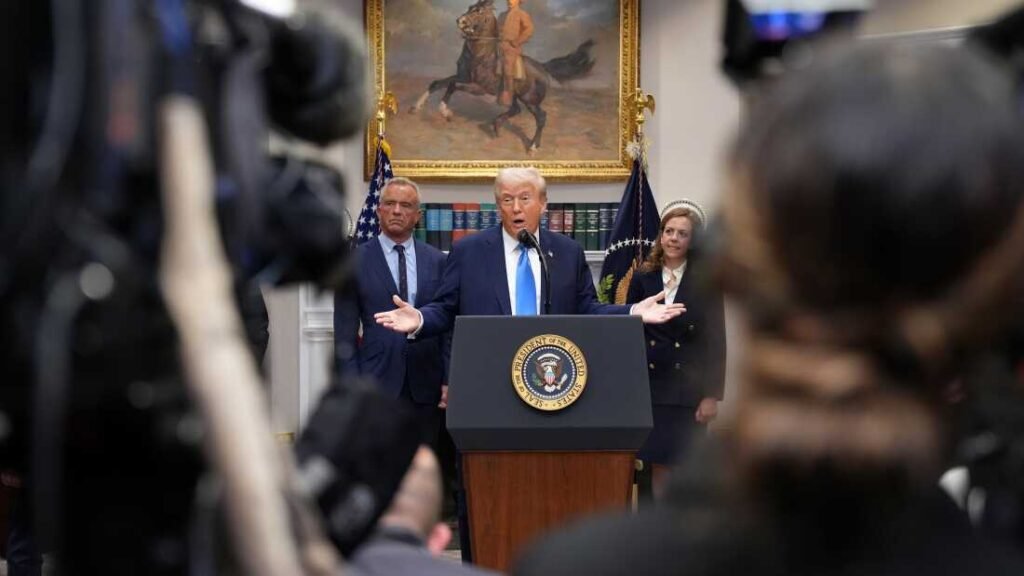
The Circumcision-Autism Connection Claim
Kennedy’s latest assertion — tying early circumcision to autism — has particularly alarmed pediatric experts. The supposed “two studies” he cited have not been peer-reviewed in major medical journals, and researchers say correlation does not equal causation.
“Infant circumcision and autism have no scientifically proven link,” said Dr. James Andrews, a pediatric neurologist at Johns Hopkins University (Wikipedia). “This theory has been circulating in fringe online communities for years, and it’s troubling to see public officials giving it oxygen.”
Trump’s Remark: “You Have to Tough It Out”
When asked what alternatives women should use for pain relief during pregnancy if not Tylenol, Trump’s response drew even more criticism.
“You have to tough it out,” he said, before adding with a chuckle, “It’s easy for me to say.”
That comment — seen by many as dismissive of women’s pain — quickly trended on X (formerly Twitter), with hashtags like #TylenolTruth and #ToughItOutTrump gaining traction.
Political analyst Abby Phillip of CNN noted that Trump’s remarks could become a flashpoint in the 2025 election cycle, further polarizing debates over science, health policy, and misinformation.
A Familiar Pattern of Controversy
Both Kennedy and Trump have histories of questioning mainstream medical science. Kennedy, a prominent vaccine skeptic long before joining Trump’s cabinet, has faced repeated criticism from the scientific community for spreading misinformation about COVID-19 vaccines and public health guidelines.
Trump, for his part, has continued to promote unconventional and often disproven medical theories — including his widely criticized comments in 2020 about injecting disinfectant to treat COVID-19.
“When politicians start acting like doctors, people get hurt,” wrote Dr. Peter Hotez (Wikipedia), a vaccine scientist at Baylor College of Medicine, on X. “Tylenol remains safe during pregnancy. Period.”
What’s Next for the Tylenol Debate
While no formal health policy has been proposed, the Trump administration’s rhetoric could prompt renewed scrutiny of over-the-counter medications used during pregnancy.
For now, experts say the guidance remains unchanged: acetaminophen is considered safe when used in moderation and under medical supervision.
But the episode underscores a deeper concern — the growing politicization of science and health.
“It’s dangerous when leaders amplify fear instead of facts,” said Dr. Masterson. “Women deserve evidence-based care, not conspiracy-based caution.”
For more Update http://www.dailyglobaldiary.com
Politics
Donald Trump Heads to Walter Reed for Medical Exam — “Just a Routine Checkup,” Says White House
At 79, former U.S. President Donald Trump will undergo his second health evaluation of the year at Walter Reed National Military Medical Center amid reports of chronic venous insufficiency, with the White House assuring the visit is “routine and precautionary.”
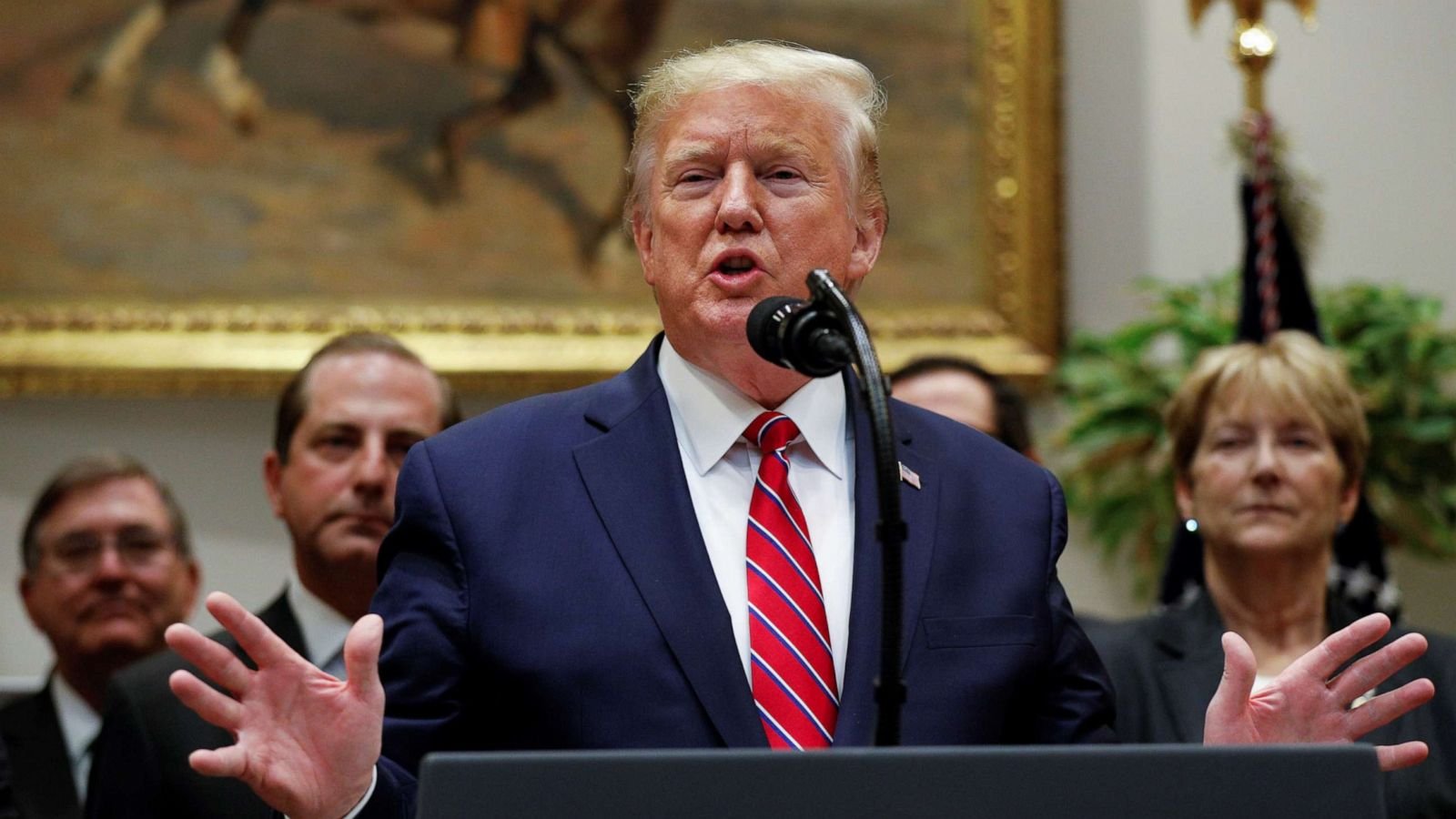
Former U.S. President Donald Trump is set to undergo a medical examination at Walter Reed Medical Center on Friday, October 10 — his second such checkup of the year — as part of what the White House describes as a “routine yearly evaluation.”
The visit comes just months after Trump was diagnosed with chronic venous insufficiency, a condition that affects circulation in the legs and can cause swelling around the ankles — a common issue for individuals in their 70s.
According to White House Press Secretary Karoline Leavitt, Trump’s trip to the medical center will also include a “planned meeting” with U.S. troops stationed at the facility, where he is expected to deliver brief remarks.
ALSO READ : Jonah Hill Looks Unrecognizable on Set of New Film With Kristen Wiig
“While there, President Trump will stop by for his routine yearly checkup,” Leavitt said in a statement Thursday. “He looks forward to spending time with the brave men and women serving our nation.”
A Routine Visit — But at a Critical Time
Friday’s appointment marks Trump’s second examination at Walter Reed this year, following a physical conducted on April 11. That earlier report, released by White House physician U.S. Navy Captain Sean Barbabella, concluded that the president was in “excellent health” and that his high cholesterol was “well controlled.”
Trump’s return to the facility has drawn attention not only because of his age — at 79, he remains the oldest person to begin a presidential term — but also due to his increasingly demanding schedule, both politically and diplomatically.
Leavitt added that the former president “may travel to the Middle East later in the day,” where he hopes to finalize an emerging peace deal between Israel and Hamas following recent reports of a ceasefire agreement.
“He’s balancing his health, leadership, and diplomacy all at once,” said a senior White House aide. “It’s classic Trump — never slowing down.”
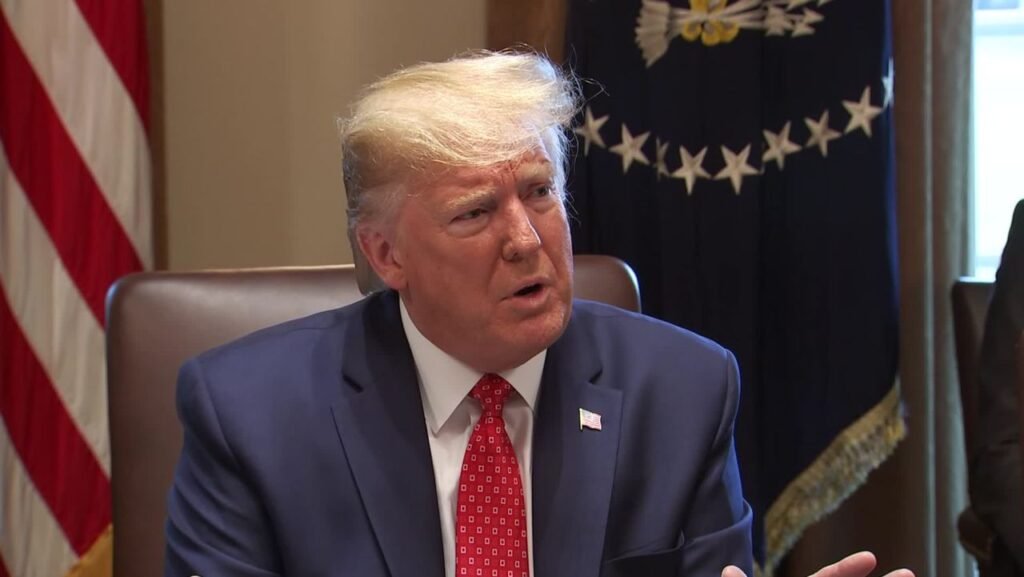
Understanding the Diagnosis: Chronic Venous Insufficiency
Trump’s diagnosis of chronic venous insufficiency (CVI) in July raised mild concern among observers, though medical experts were quick to note that the condition is manageable.
According to Johns Hopkins Medicine, CVI occurs when veins in the legs struggle to return blood to the heart, often leading to swelling or discomfort. It is more common in older adults and people who spend long hours standing.
Dr. Barbabella’s team reportedly recommended lifestyle adjustments such as compression therapy and moderate exercise to support healthy circulation.]
“The president has followed all medical guidance and remains physically active,” said a source familiar with his care. “He’s in remarkably strong shape for his age.”
Trump’s Health and Public Life
The topic of Trump’s health has long intrigued both supporters and critics, given his grueling travel schedule, late-night speeches, and ongoing political commitments.
Since leaving the White House in 2021, Trump has maintained an active public life, frequently appearing at campaign-style rallies, policy roundtables, and media interviews.
Earlier this year, he made headlines after spending more than 12 hours on his feet during consecutive events across three states. “He’s got the energy of a 40-year-old,” joked a senior campaign aide.
Still, even Trump himself has occasionally acknowledged the realities of aging. “I feel great, but I listen to my doctors,” he said in a July interview on Fox News. “You can’t make America great again if you’re not taking care of yourself first.”
A President Who Won’t Slow Down
Despite his diagnosis, Trump’s circle insists he remains as active and sharp as ever. Aides say his daily schedule continues to include early-morning briefings, phone calls with advisors, and ongoing work on foreign policy initiatives.
His potential Middle East visit underscores that pace. If confirmed, it would be his second international trip this fall, following September’s high-profile visit to London for trade discussions.
“He’s always been unstoppable,” said a former Secret Service agent who served during Trump’s first term. “Even when he’s under the weather, he keeps moving — that’s who he is.”
What Comes Next
After his medical exam, Trump is expected to release a summary of results through the White House Office of the Physician, continuing his tradition of annual transparency reports.
While his doctors have described his condition as stable, medical professionals emphasize the importance of regular monitoring.
“Routine evaluations are critical for older adults in high-stress leadership roles,” said Dr. Sanjay Gupta, CNN’s chief medical correspondent. “As long as he’s following up regularly, there’s no cause for alarm.”
For now, Trump appears undeterred — viewing the exam as just another day on a packed presidential calendar.
“He’ll go in, shake a few hands, get checked up, and get right back to business,” one aide said with a grin.
And for Donald Trump, business — and politics — rarely ever stop.
Politics
“Historic Day for the Middle East…” Donald Trump Announces Israel–Hamas Peace Deal, Says “The World Is Watching Something Remarkable”
“Historic Day for the Middle East…” Donald Trump Announces Israel–Hamas Peace Deal, Says “The World Is Watching Something Remarkable”
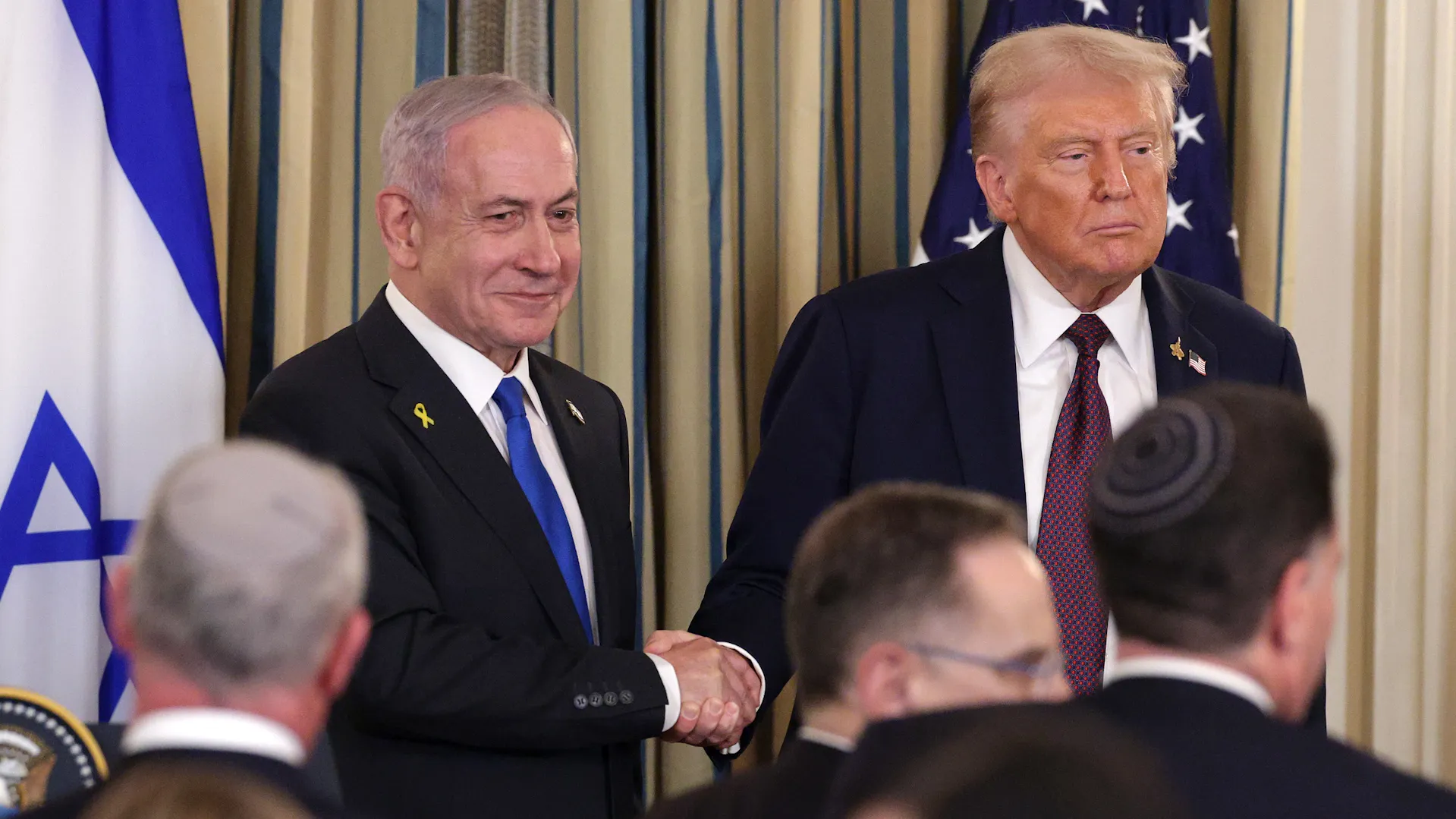
In a stunning geopolitical moment that few saw coming, former U.S. President Donald Trump announced on Thursday that Israel and Hamas have officially signed off on the first phase of a peace plan aimed at ending years of bloodshed and hostility in the region.
Speaking from his estate at Mar-a-Lago, Trump called the agreement “a monumental breakthrough that proves peace is always possible — even among the unlikeliest of adversaries.”
“Today, Israel and Hamas have taken the first step toward lasting peace,” Trump said during his announcement. “It’s not just a deal between two sides — it’s a message to the world that hope and diplomacy can prevail over hate and terror.”
ALSO READ : Jonah Hill Looks Unrecognizable on Set of New Film With Kristen Wiig
The First Phase: Ceasefire and Humanitarian Relief
According to preliminary details shared with the press, the initial phase of the agreement includes a comprehensive ceasefire, humanitarian corridors for aid delivery, and the establishment of a joint monitoring committee composed of representatives from both sides as well as neutral international observers.
A senior official familiar with the talks told Reuters that this stage also includes a temporary exchange of detainees and the creation of “safe zones” to allow displaced civilians to return to their homes.
The move is being hailed as the most significant peace effort since the Oslo Accords, which were signed three decades ago but ultimately collapsed amid renewed violence and mistrust.
A Legacy Move for Trump
Trump, who brokered several Middle East normalization deals during his presidency through the Abraham Accords, said he had been working “behind the scenes” with regional leaders for months to facilitate dialogue between Jerusalem and Gaza.
“This deal didn’t happen overnight,” Trump emphasized. “It required courage — from both sides — and a shared belief that war is not destiny.”
Diplomatic sources confirmed that Egypt, Qatar, and Saudi Arabia played key mediating roles, helping to bridge political and security gaps that had previously derailed similar negotiations.
“This is Trump trying to cement his foreign policy legacy beyond the Abraham Accords,” said one analyst from the Council on Foreign Relations. “If this holds, it could redefine his image from dealmaker to peacemaker.”
Global Reaction: Cautious Optimism
World leaders and international organizations reacted with cautious optimism.
United Nations Secretary-General António Guterres praised the announcement, calling it “a hopeful step toward stability in a region long plagued by pain.”
However, some experts warned that implementing the deal would require unwavering commitment from both sides. “The challenge isn’t in signing a document — it’s in changing decades of mistrust,” said former diplomat Dennis Ross, who served as a Middle East peace negotiator under multiple U.S. administrations.
In Tel Aviv, reactions were mixed. Some Israeli citizens welcomed the truce, while others voiced concerns that Hamas could use the ceasefire to regroup.
Meanwhile, in Gaza City, many residents expressed relief at the prospect of quiet after months of bombardment. “All we want is to live without fear,” said one local teacher, who asked not to be named for safety reasons.
Hamas Responds: “This Is a Beginning, Not an End”
In a rare joint statement, Hamas officials confirmed their agreement to the deal, emphasizing that the group sees it as “a step toward dignity, justice, and self-determination for the Palestinian people.”
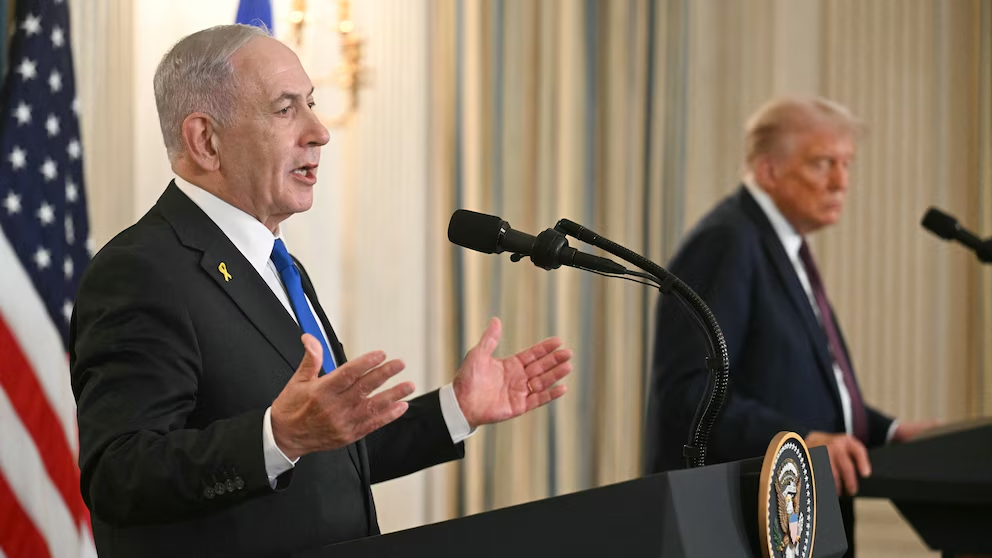
“We have agreed to give peace a chance,” a Hamas spokesperson told Al Jazeera. “But our participation depends on Israel’s willingness to respect humanitarian boundaries.”
The Israeli Prime Minister’s Office also released a statement acknowledging the accord and thanking mediators for their role, while maintaining that national security remains “non-negotiable.”
Trump’s Return to the Spotlight
The announcement comes as Trump continues to dominate American and global political conversations ahead of the 2025 landscape.
His statement on the deal echoed his trademark self-assured tone:
“Many people said peace between Israel and Hamas was impossible — I’ve always said, ‘Nothing’s impossible if you have the right people at the table.’ And today, we proved that.”
Political analysts believe the move could significantly boost Trump’s global standing and strengthen his appeal among voters who previously viewed his foreign policy as unpredictable yet effective.
“He’s positioning himself as the ultimate negotiator once again,” said political strategist David Axelrod. “Love him or hate him, Trump has a knack for making headlines that shift the global narrative.”
The Road Ahead
While the announcement is historic, experts warn that real peace will depend on the actions taken in the coming weeks. The next phases of the agreement reportedly include discussions on border management, reconstruction aid, and long-term security arrangements.
For now, both sides seem cautiously committed. As one U.N. observer noted:
“If this fragile peace holds, it could mark the beginning of a new chapter — not only for Israel and Palestine, but for the entire Middle East.”
And for Donald Trump, it could mark a return not just to political prominence — but to the global stage of history.
-

 Sports1 week ago
Sports1 week agoTottenham’s Champions League wake-up call… why Spurs must stop looking like a Europa League side
-

 Tech3 days ago
Tech3 days agoChatGPT Takes a Leap: Spotify, Canva, and More Integrated – Revolutionizing User Experience!
-

 Entertainment1 week ago
Entertainment1 week agoSurvivor Season 49 episode 2 shocker Kele tribe loses again and fans stunned by who went home
-

 Entertainment6 days ago
Entertainment6 days agoCharlie Hunnam reveals chilling transformation into serial killer Ed Gein for Ryan Murphy’s Monster… “I didn’t want to glamorize it”
-

 Sports1 week ago
Sports1 week ago‘Silent killer’ Cam Schlittler stuns Red Sox as Yankees rookie makes history with 12 strikeouts
-

 Sports6 days ago
Sports6 days agoShohei Ohtani finally pitches in MLB playoffs after 2,746 days… will this be the moment that defines Dodgers vs Phillies?
-

 Entertainment1 week ago
Entertainment1 week agoBill Burr shocks fans after Riyadh comedy festival set says Saudis are just like us
-
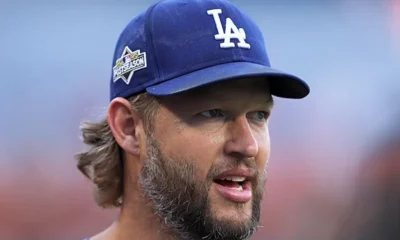
 Sports1 day ago
Sports1 day agoDodgers fans left heartbroken as Clayton Kershaw faces nightmare inning vs. Phillies — “No one wanted to see this…”




